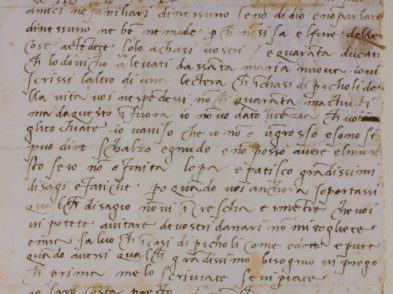I spent my first years in Florence teaching parts of speech to mother-tongue English speakers who considered grammar the Boogie man under the bed. Now my stints as ‘grammar girl’ are limited to a few English lessons a month with my businessman friend, who needs to speak the language when he travels the world. Worried about his looming London trip, Andrea had prepared a series of ‘every day’ dialogues with the help of a computerized translator. Alas, trying to convince an elementary student of the uselessness of such devices is like trying to squeeze blood from a turnip. But it was my job to try.
‘In English, we don’t say I would want a ticket please. Want is not usually used in the conditional,’ I told him.
‘Why?’
‘Well, because we save the phrase would want to talk about things we wish for: If I could eat anything in the world right now, I would want a double chocolate cheesecake.’
‘It means you’re hungry for cake but there is none?’
‘Exactly.’
Andrea thought for a moment and then smiled. ‘In Italy, we always use would want to ask for things. Vorrei leaves room for the thrill of doubt. In America, you are always very sure that you can have what you want, as long as you pay for it. That is the biggest differ-ence between our two countries.’ ‘Oh no,’ I sighed. He had said this with an off-handed nonchalance, but a comment like that can drive me to three straight nights of cultural insomnia. My student left the lesson half an hour later happy as a clam. With three written dialogues folded in his pocket, he’d feel safe at the airport, the hotel, and the museum ticket window. He had been trained to make reasonable requests. I watched him go with ‘the thrill of doubt’ whirling in my brain and the weight of vorrei on my mind.
The more I think about it, the more I find that requests represent the root of a culture. If you want to know about a country, discover how people ask for things. Why? Because ‘the art of exchange’ is one of the building blocks of society. After all, communities are born once people start trading. In Italy, all requests are wrapped in wistful longing. With vorrei, even ordering in a restaurant is cause for suspense. You are wel-come to say vorrei a bistecca ben cotta, but chances of the waiter actually fulfilling your yearnings are about as probable as winning the lottery without a ticket. The use of the conditional here is very apropos. You can want all you want, baby, but you ain’t gonna get. In Tuscany, a well-cooked T-bone steak is not considered a legitimate craving. For Italians, the success of requests always depends on the validity of the desire.
In efforts to soften their sense of entitlement, English speakers also use the conditional for making requests, but their slant is entirely different. In English, we place all our eggs in the ‘customer service basket.’ Only people who truly believe that clerks are there to please the customer could invent a phrase like ‘I’d like a ticket to Bristol, please.’
In Italy, a passenger who tells the conductor mi piacerebbe un biglietto per Brindisi, will more likely get a smirk than a ticket. But then, the same would probably occur in Britain if a nervous man in a bowler hat came rapping on the Plexiglas, ‘Sir, I would be im-mensely pleased by a train ticket, thank you.’ Vorrei, the key word for conditional desire, is much more likely to get you what you need. But ‘the thrill of doubt’ always applies. In the art of Italian exchange, a clerk’s job is not to keep the customer satisfied, it’s to judge whether or not the client can or should be made happy.
The essence of vorrei hit home for me two days ago, after a lengthy conversation with Paola, Wind telephone operator number 3456. I had called the toll free number with high hopes. In the age of mass communication, the possibility of a home-phone did not initially strike me as an unreasonable appeal. ‘Vorrei ADSL ed una linea telefonica,’ I told the Wind lady.
‘I’ll have to see if you are allowed one,’ she answered.
It only took a ten-minute check to prove that I was somehow worthy. ‘Okay,’ she said. ‘I’ve put you on the waiting list.’
‘Waiting list? But how long will it take to get the line?’
‘Minimum 45 days. Maximum 180.’
‘But 180 days is six months!’ I protested.
‘Yes, but that’s the maximum wait.’
Not that I want to be cynical, but in Italy, one shouldn’t even bother to remember the minimums. The maximum wait always ap-plies. I argued with the woman for another 15 minutes and then hung up. Paola would not listen to reason. Hysteria did not inspire her to take immediate action against third world telecommunication policies. Resigned, I signed up for the waiting list. Forty days or 180. The ‘thrill of doubt’ did almost nothing to curb the stinging inevitably of six months without an Internet connection. There’s al-ways a bright side, though. Paola’s inability to do ‘what I’d like’ helps prove my newest linguistic theory. In Italy, purposeful requests almost always turn into pining. Vorrei does its job beautifully. ‘I’d want a phone line—if I could have anything in the whole wide world.’








